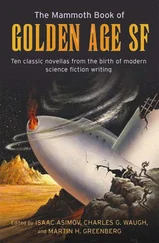Edward Hoch - Isaac Asimov's Worlds of Fantasy. Book 6 - Mythical Beasties
Здесь есть возможность читать онлайн «Edward Hoch - Isaac Asimov's Worlds of Fantasy. Book 6 - Mythical Beasties» весь текст электронной книги совершенно бесплатно (целиком полную версию без сокращений). В некоторых случаях можно слушать аудио, скачать через торрент в формате fb2 и присутствует краткое содержание. Жанр: Фантастика и фэнтези, на английском языке. Описание произведения, (предисловие) а так же отзывы посетителей доступны на портале библиотеки ЛибКат.
- Название:Isaac Asimov's Worlds of Fantasy. Book 6: Mythical Beasties
- Автор:
- Жанр:
- Год:неизвестен
- ISBN:нет данных
- Рейтинг книги:5 / 5. Голосов: 1
-
Избранное:Добавить в избранное
- Отзывы:
-
Ваша оценка:
- 100
- 1
- 2
- 3
- 4
- 5
Isaac Asimov's Worlds of Fantasy. Book 6: Mythical Beasties: краткое содержание, описание и аннотация
Предлагаем к чтению аннотацию, описание, краткое содержание или предисловие (зависит от того, что написал сам автор книги «Isaac Asimov's Worlds of Fantasy. Book 6: Mythical Beasties»). Если вы не нашли необходимую информацию о книге — напишите в комментариях, мы постараемся отыскать её.
Isaac Asimov's Worlds of Fantasy. Book 6: Mythical Beasties — читать онлайн бесплатно полную книгу (весь текст) целиком
Ниже представлен текст книги, разбитый по страницам. Система сохранения места последней прочитанной страницы, позволяет с удобством читать онлайн бесплатно книгу «Isaac Asimov's Worlds of Fantasy. Book 6: Mythical Beasties», без необходимости каждый раз заново искать на чём Вы остановились. Поставьте закладку, и сможете в любой момент перейти на страницу, на которой закончили чтение.
Интервал:
Закладка:
The hold of the barge contained two hundred glass vats, each of two quarts capacity, each two-thirds full of pale liquid.
The barge was propelled by oars-a score on either side-and moved with not inconsiderable speed.
The swindlers paddled with all speed to Tranque Float and the hoodwink towers flickered an alarm: The… dissidents … are… returning… m… force! They… come … in… strange… black… canoes… and… art … even… more… peculiar… black… barge. They … show… no… fear.
The flotilla continued up the line of floats: Thrasneck, Bickle, Green Lamp, and at last Fay, Quatrefoil, and finally Apprise.
In the water before the lagoon lolled King Kragen-a bloated monstrous King Kragen, dwarfing the entire flotilla.
King Kragen swung about, the monstrous vanes sucking whirlpools into the ocean. The eyes with opalescent films shifting back and forth within, fixed upon the black sheathing of canoe, barge and armor, and he seemed to recognize the substance as kragen hide, for he emitted a snort of terrible displeasure, jerked his vanes, and the ocean sucked and swirled.
The barge swung sidewise to King Kragen. The two crossbows, each cocked and strung, each armed with MI iron harpoon smelted from human blood, were aimed.
King Kragen sensed menace. Why otherwise should men be so bold? He twitched his vanes, inched forward-to within a hundred feet. Then he lunged. Vanes dug the water; with an ear-shattering shriek King Kragen charged, mandibles snapping.
The men at die crossbows were pale as sea-foam; their fingers twitched. Sklar Hast turned to call, "Fire!" but his voice caught in his throat and what he intended for an incisive command sounded as a startled stammer. But the command was understood. The left crossbow thudded, snapped, sang: the harpoon, trailing a black cable sprang at King Kragen's turret, buried itself. King Kragen hissed.
The right crossbow fired; the second harpoon stabbed deep into the turret. Skiar Hast motioned with his hand to the men in the hold. "Connect." The men joined copper to copper.
In the hold two hundred voltaic cells, each holding ten thin-leaved cathodes and ten thin-leaved anodes, connected first in four series of fifty, and these four series in parallel, poured a gush of electricity along the copper cables wrapped in varnished pad-skin, which led to the harpoons. Into King Kragen's turret poured the energy, and King Kragen went stiff. His vanes protruded at right angles to his body. Sklar Hast said to Meth Cagno, "Your experiments seem to be as valid as with the lesser kragen-luckily."
"1 never doubted," said Meth Cagno.
Sklar Hast waved to the canoes. They swung toward King Kragen. beaching on the rigid subsurface platform. The men swarmed up the torso. With mallets and copper chisels they attacked the lining between dome and turret wall. There was thirty feet of seam, but many hands at work. The lining was broken; bars were inserted into the crack; all heaved. With a splitting sound the dome was dislodged. It slid over and into the water; the men leaped down into the knotted gray cords and nodes and began hacking.
On Apprise Float a great throng had garnered. One man, running back and forth, was Barquan Blasdel. Finally he persuaded several score of men to embark in coracles and attack the flotilla. Eight black canoes were on guard. Paddles dug the water, the canoes picked up momentum, crashed into the foremost coracles, crushing the fragile shells, throwing n»e men into the water. The canoes backed away, turned toward the other coracles, which retreated.
Out in the lagoon King Kragen's nerve nodes had been cast into the sea. The harpoons were extracted, the flow of electricity extinguishedKing Kragen floated limp, a lifeless hulk. The men plunged into the sea to wash themselves, clambered back up on the dead swimming platform, boarded their canoes.
The barge now eased toward Apprise Float. Barquan Blasde) gesticulated to the folk like a crazy man. "To arms! Stakes, chisels, mallets, knives, bludgeons! Smile the miscreants!"
Sklar Hast called to the throng, "King Kragen is dead.
What do you say to this?"
There was silence; then a faint cheer and a louder cheer, and finally uproarious celebration.
Sklar Hast pointed a finger at Barquan Blasdel "That man must die. He murdered Henry Bastaff. He has fed your food to the vile King Kragen. He would have continued doing so until King Kragen overgrew the entire float."
Barquan Blasdet made the mistake of turning to flee-an act which triggered the counterimpulse to halt him. When he was touched, he smote, and again he erred, for the blow brought a counterblow and Barquan Blasdel was presently torn to pieces.
"What now?" called the crowd. "What now, Sklar Hast?"
"Nothing whatever, unless you choose to kill the other Intercessors. King Kragen is dethroned; our duty is done. We now return to the New Floats."
From the shore someone called out. "Come ashore, men of the New Floats, and share our great joy- Greet your old friends, who long have been saddened at your absence! Tonight the arrack will flow and we will play the pipes and dance in the light of our yellow lamps!"
Sklar Hast shook his head, waved his hand and called back: "Now we return to the New Floats. In a week certain of us will return, and the weeks after that will see constant traffic between Old and New Floats, and out to floats still unknown. King Kragen is dead, the lesser kragen are our prey, so who is there to stop us? Now that we know metal and glass and electricity, all things are possible. Rejoice with all our goodwill. For now, farewell."
The barge and the canoes swung about; oars and paddles dipped into the ocean, the black flotilla receded into the east, and disappeared.
Mermaid
There was an old belief that every land animal had its counterpart in the sea. There's nothing to that, of course, but we still see traces of that legend in the names given some sea creatures. The "sea horse" is a tiny creature, but it does have a head reminiscent of that of a small. bony horse. Then there is the sea cow (manatee), the sea hog (porpoise), the sea lion and sea elephant (seals), the sea robin and sea wolf (certain fish), and so on.
It would be astonishing if, under these circumstances, people didn't decide the sea must also harbor the equivalent of human beings-sea people, in other words.
They did decide that, and legends are full of ' 'mermen'' and "mermaids." (The prefix is from an archaic English word "mere" meaning "sea" or "lake.") There are many circumstantial tales of mariners having seen mermaids, but nevertheless they do not, in reality, exist. Some people suggest that sailors are fooled by the sight of manatees or dugongs (the "sea cows" referred to above). These have breasts in the human position, and a female manatee rising to the surface with one flipper clasping her young to her breast might, at a distance, and to a near-sighted sailor, suggest a mermaid.
Mermaids are sometimes viewed as malevolent creatures who deliberately lure ships onto reefs and rocks by exhibiting their beauty to sailors who have not seen a woman for a long time. In this way, mermaids resemble Andersen the sirens of Greek legend, and the lorelei of Teutonic legend. All may be personifications of wind and storm.
In more modem times, however, mermaids tend to be portrayed as sweet and innocent, playful and alluring, and in the following story, this is done.
The Little Mermaid
by Hans Christian Andersen
Far, far from land, where the waters are as blue as the petals of the cornflower and as clear as glass, there, where no anchor can reach the bottom, live the mer-people. So deep in this pan of the sea that you would have to pile many church towers on top of each other before one of them emerged above the surface.
Читать дальшеИнтервал:
Закладка:
Похожие книги на «Isaac Asimov's Worlds of Fantasy. Book 6: Mythical Beasties»
Представляем Вашему вниманию похожие книги на «Isaac Asimov's Worlds of Fantasy. Book 6: Mythical Beasties» списком для выбора. Мы отобрали схожую по названию и смыслу литературу в надежде предоставить читателям больше вариантов отыскать новые, интересные, ещё непрочитанные произведения.
Обсуждение, отзывы о книге «Isaac Asimov's Worlds of Fantasy. Book 6: Mythical Beasties» и просто собственные мнения читателей. Оставьте ваши комментарии, напишите, что Вы думаете о произведении, его смысле или главных героях. Укажите что конкретно понравилось, а что нет, и почему Вы так считаете.








